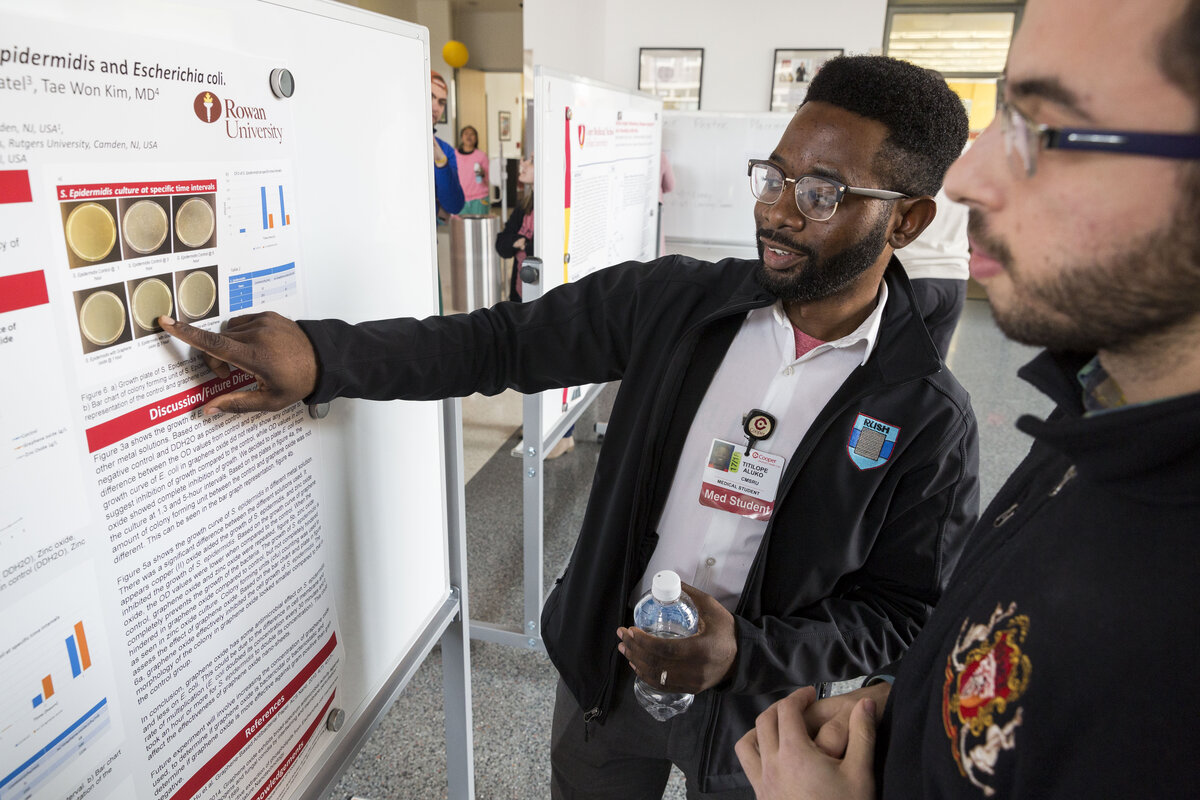Medical Student Research
Research opportunities can provide valuable experiences for medical students by enhancing what students are learning in the classroom, helping them become more well-rounded physicians, and opening doors for residencies and future career opportunities. It also gives them opportunities to begin contributing to advances in science and medicine at the earliest stages of their careers.
Our clinical and biomedical science faculty are engaged in an array of publicly and privately funded research projects. In the past academic year, Cooper Medical School of Rowan University (CMSRU) faculty received nearly $4 million in research funding and published 349 scholarly research articles. Our faculty members are committed to mentoring medical students with specific research interests and providing opportunities for involvement in important scientific and medical research.
Summer Research Program
At CMSRU, we offer a robust Student Summer Research Program with opportunities for students to choose clinical or laboratory based projects. Students interested in particular fields of study are matched with relevant projects and mentors. Positions are made available by the Associate Dean of Research in winter to begin work the following summer. These opportunities are offered by researchers at CMSRU, Cooper University Hospital, and the various sister colleges within Rowan University. Examples include determining specific cells involved in healing the body, evaluating the effects of different drugs on the neurological system, testing the efficacy of new drugs in cutting short the progression of diseases, and more. Many CMSRU students have gone on to present their findings at national conferences and others have been published in leading journals.
Annual Camden Scholars' Forum
Each spring medical students, residents, fellows and clinical staff from Cooper University Hospital participate in an annual research poster competition known as The Camden Scholars’ Forum. Students must have abstracts accepted to be eligible for this event. Research posters are virtually displayed, where they are judged by senior clinical and biomedical sciences faculty. Winners in various categories present their posters during a special session. In 2022, 165 posters by medical students qualified for the forum in case study, performance improvement, and clinical research categories.
Extramural Grants, Fellowships and Awards
Students can further research interests by applying for grant funding through many external organizations. Research can be performed at CMSRU or a host institution depending on specifications of the selection committee. Grant stipends can cover 8-12 weeks of research for a summer project or can extend over the course of a year in cases where students embark on a "research year" during medical school.
Advice for successful applications:
First finding and identifying a research mentor is critical, as he or she will provide letters of recommendation and critical feedback for your proposal. Projects with a "proof of concept", or initial data set that selection committees can review, show promise and are more likely to pique interests. Therefore, students should aim to work with Principle Investigators (PI) who have ongoing research in a certain topic and align their project proposal as a branch or extension of the lab's overall purpose. It is possible to have more than one PI. Some of the strongest award and fellowship applications have a powerhouse pairing of clinicians at Cooper University Hospital and biomedical scientists at CMSRU. When drafting your submission, cite publications in the current literature to set the framework for your project, posit initial data, then explain why further study is warranted and why you should be the one performing it (such as unique interest in the field, previous research experience, or access to research facilities with capabilities not found at other centers).
The proportion of grants accepted positively correlates with the number of grants submitted. In other words, do not be discouraged if you apply and do not receive funding the first time! Career scientists spend multiple rounds perfecting methodology and sharpening their research aims to receive NIH and private funding. As a medical student, extramural opportunities offer a novel way to distinguish oneself outside of standardized grades or clinical evaluations.
